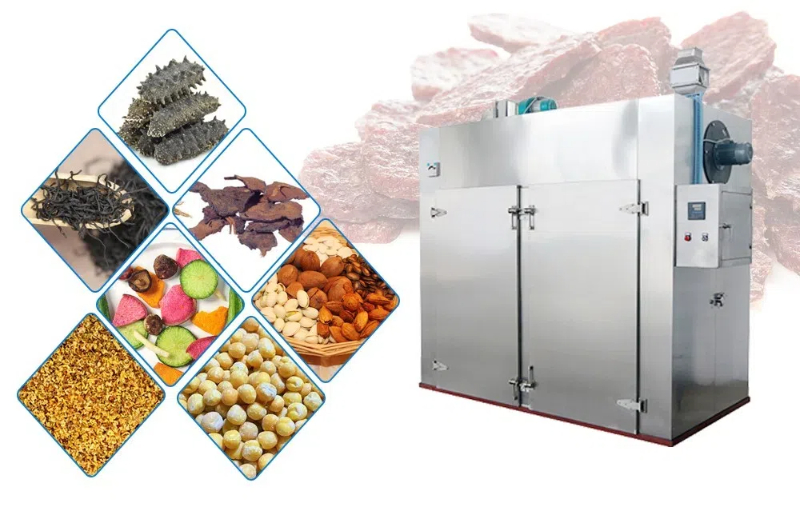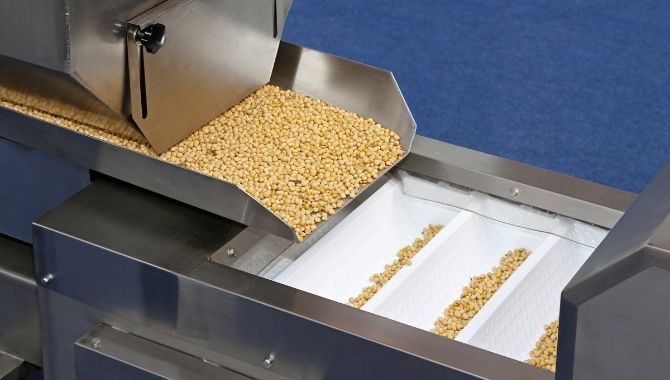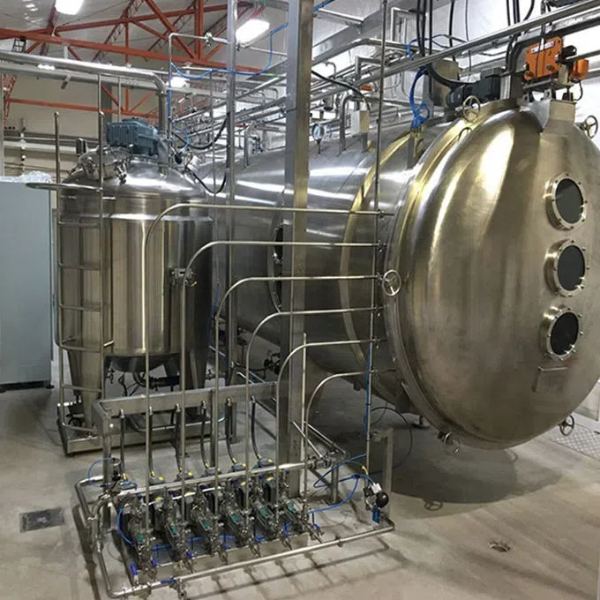
Content Menu
● Introduction to Dried Food Packaging Machines
● The Evolution of Dried Food Packaging Technology
>> Early Beginnings
>> Introduction of Semi-Automated Systems
>> Rise of Fully Automated Machines
>> Integration of Digital Technology
>> Smart Packaging Solutions
● Types of Dried Food Packaging Machines
>> Vertical Form Fill Seal (VFFS) Machines
>> Horizontal Form Fill Seal (HFFS) Machines
>> Multi-Head Weigher Packaging Systems
>> Vacuum Sealing Machines
>> Pouch Filling Machines
● Key Features of Modern Dried Food Packaging Machines
>> High-Speed Operation
>> Precision Weighing and Dosing
>> Flexible Packaging Options
>> Easy Cleaning and Maintenance
>> User-Friendly Interfaces
>> Integration Capabilities
● The Impact of Dried Food Packaging Machines on the Food Industry
>> Increased Productivity and Efficiency
>> Improved Food Safety and Quality
>> Enhanced Product Shelf Life
>> Greater Packaging Flexibility
>> Sustainability Improvements
● Challenges and Future Trends in Dried Food Packaging
>> Sustainability Concerns
>> Customization and Personalization
>> Integration of Artificial Intelligence
>> Addressing Labor Shortages
>> Enhancing Traceability
● Conclusion
● Frequently Asked Questions
>> 1. What are the main advantages of using dried food packaging machines?
>> 2. How do multi-head weigher packaging systems work?
>> 3. What is vacuum sealing, and why is it important for dried foods?
>> 4. How are dried food packaging machines addressing sustainability concerns?
>> 5. What role does artificial intelligence play in modern dried food packaging machines?
Introduction to Dried Food Packaging Machines
In the ever-evolving landscape of the food industry, dried food packaging machines have emerged as game-changers, revolutionizing the way we preserve, package, and distribute dry food products. These sophisticated pieces of equipment have become indispensable in modern food processing facilities, offering unparalleled efficiency, precision, and versatility in packaging a wide array of dried foods, from fruits and nuts to grains and spices.
Dried food packaging machines are specialized automated systems designed to handle, measure, and package dry food products in various types of packaging materials. These machines have transformed the food packaging process, significantly reducing manual labor, increasing production speeds, and ensuring consistent quality across batches. As consumer demands for convenience, freshness, and sustainability continue to grow, the role of these machines in meeting these expectations has become increasingly crucial.
The Evolution of Dried Food Packaging Technology
The journey of dried food packaging machines from simple manual devices to highly sophisticated automated systems is a testament to human ingenuity and technological progress. Let's explore the key milestones in this evolution:
Early Beginnings
In the early days of food packaging, most processes were manual or semi-automated at best. Workers would measure and package dried foods by hand, a labor-intensive and time-consuming process prone to inconsistencies and contamination risks.
Introduction of Semi-Automated Systems
The mid-20th century saw the introduction of semi-automated packaging systems. These machines could perform basic functions like weighing and filling, but still required significant human intervention.
Rise of Fully Automated Machines
The late 20th century marked a significant leap with the development of fully automated dried food packaging machines. These systems could handle the entire packaging process, from measuring and filling to sealing and labeling, with minimal human intervention.
Integration of Digital Technology
The dawn of the digital age brought about a new era in packaging technology. Modern dried food packaging machines are equipped with advanced sensors, programmable logic controllers (PLCs), and sophisticated software that enable precise control, real-time monitoring, and data analytics.
Smart Packaging Solutions
Today, we're witnessing the emergence of smart packaging technology for dry foods. These cutting-edge systems incorporate IoT (Internet of Things) capabilities, allowing for remote monitoring, predictive maintenance, and seamless integration with other production systems.


Types of Dried Food Packaging Machines
The world of dried food packaging machines is diverse, with various types of equipment designed to meet different packaging needs. Here are some of the most common types:
Vertical Form Fill Seal (VFFS) Machines
VFFS machines are versatile and widely used for packaging a variety of dried foods. They form a tube from a flat roll of film, fill it with the product, and seal it to create individual packages.
Horizontal Form Fill Seal (HFFS) Machines
HFFS machines are ideal for products that require gentle handling or have a flat profile. They're commonly used for packaging dried fruits, nuts, and snack bars.
Multi-Head Weigher Packaging Systems
These systems combine precision weighing with high-speed packaging. They're particularly useful for mixed dried fruits and nuts, ensuring accurate proportions in each package.
Vacuum Sealing Machines
Vacuum sealing is crucial for extending the shelf life of many dried foods. These machines remove air from the package before sealing, preventing oxidation and moisture ingress.
Pouch Filling Machines
Designed for pre-made pouches, these machines are excellent for flexible packaging of dried snacks and other dry goods.
Key Features of Modern Dried Food Packaging Machines
Today's dried food packaging machines are marvels of engineering, packed with features that ensure efficiency, quality, and versatility. Let's explore some of these key features:
High-Speed Operation
Modern machines can package hundreds, even thousands, of units per minute, significantly boosting production capacity.
Precision Weighing and Dosing
Advanced weighing systems ensure accurate product quantities in each package, minimizing waste and ensuring compliance with labeling regulations.
Flexible Packaging Options
Many machines can handle various packaging materials and formats, from bags and pouches to boxes and containers.
Easy Cleaning and Maintenance
Hygienic design features, such as tool-less disassembly and washdown capabilities, make cleaning and maintenance more efficient.
User-Friendly Interfaces
Intuitive touchscreen controls and recipe management systems make it easy for operators to adjust settings and switch between products.
Integration Capabilities
Modern machines can easily integrate with other systems in the production line, from upstream processing equipment to downstream palletizing systems.

The Impact of Dried Food Packaging Machines on the Food Industry
The widespread adoption of dried food packaging machines has had a profound impact on the food industry. Let's examine some of these effects:
Increased Productivity and Efficiency
Automated packaging machines have dramatically increased production speeds and reduced labor costs, allowing companies to meet growing demand more efficiently.
Improved Food Safety and Quality
By minimizing human contact with food products and maintaining consistent packaging conditions, these machines help ensure higher standards of food safety and quality.
Enhanced Product Shelf Life
Advanced sealing technologies, particularly in vacuum sealing for dried foods, have significantly extended the shelf life of many products, reducing food waste and expanding distribution possibilities.
Greater Packaging Flexibility
Modern machines can quickly adapt to different package sizes and formats, allowing companies to respond more readily to changing market demands and consumer preferences.
Sustainability Improvements
Many modern dried food packaging machines are designed with sustainability in mind, optimizing material usage and supporting the use of eco-friendly packaging materials.
Challenges and Future Trends in Dried Food Packaging
While dried food packaging machines have brought numerous benefits, the industry also faces several challenges and is continually evolving. Here are some key areas to watch:
Sustainability Concerns
There's growing pressure to develop more sustainable packaging solutions for dry goods. This includes using recyclable or biodegradable materials and designing machines that minimize packaging waste.
Customization and Personalization
As consumer demand for personalized products grows, packaging machines will need to become more flexible to handle smaller batch sizes and custom packaging designs.
Integration of Artificial Intelligence
AI and machine learning are set to play a bigger role in packaging operations, from predictive maintenance to quality control and process optimization.
Addressing Labor Shortages
With many industries facing labor shortages, there's a push towards even greater automation in packaging processes.
Enhancing Traceability
Improved traceability features in packaging machines will help companies better track their products throughout the supply chain, enhancing food safety and recall management.
Conclusion
Dried food packaging machines have come a long way from their humble beginnings, evolving into sophisticated systems that are integral to modern food production. From automatic dried food packaging machines to smart packaging technology for dry foods, these innovations have revolutionized how we package and distribute dried foods.
As we look to the future, it's clear that dried food packaging machines will continue to play a crucial role in meeting the challenges of food production and distribution. Whether it's through more sustainable packaging solutions, increased automation, or smarter, more connected systems, these machines will be at the forefront of innovation in the food industry.
The journey of dried food packaging machines is far from over. As technology continues to advance and consumer demands evolve, we can expect to see even more exciting developments in this field. From high-speed dried food bagging machines to flexible packaging for dried snacks, the future of food packaging is bright, efficient, and full of possibilities.

Frequently Asked Questions
1. What are the main advantages of using dried food packaging machines?
Answer: The main advantages include increased productivity and efficiency, improved food safety and quality, extended product shelf life, greater packaging flexibility, and potential sustainability improvements. These machines can significantly reduce labor costs, minimize human contact with food products, and allow for quick adaptation to different package sizes and formats.
2. How do multi-head weigher packaging systems work?
Answer: Multi-head weigher packaging systems use multiple weighing heads to combine different product components to achieve a target weight. Each head weighs a portion of the product, and a computer calculates the best combination of heads to reach the desired weight most accurately. This system is particularly useful for packaging mixed dried fruits and nuts, ensuring consistent proportions and weights in each package.
3. What is vacuum sealing, and why is it important for dried foods?
Answer: Vacuum sealing is a packaging method that removes air from the package before sealing it. This process is crucial for dried foods because it helps prevent oxidation and moisture ingress, which can lead to spoilage or loss of quality. By removing air, vacuum sealing significantly extends the shelf life of dried foods, maintains their flavor and nutritional value, and prevents the growth of aerobic bacteria and molds.
4. How are dried food packaging machines addressing sustainability concerns?
Answer: Dried food packaging machines are addressing sustainability concerns in several ways:
1. Optimizing material usage to reduce waste
2. Supporting the use of eco-friendly and recyclable packaging materials
3. Improving energy efficiency in their operations
4. Enabling the production of right-sized packages to minimize overpackaging
5. Incorporating features that allow for easy recycling or composting of packages
5. What role does artificial intelligence play in modern dried food packaging machines?
Answer: Artificial Intelligence (AI) is increasingly being integrated into dried food packaging machines to enhance various aspects of the packaging process:
1. Predictive maintenance: AI can analyze machine data to predict when maintenance is needed, reducing downtime.
2. Quality control: AI-powered vision systems can detect defects in packages or products at high speeds.
3. Process optimization: AI can analyze production data to suggest improvements in machine settings or processes.
4. Adaptive control: AI can make real-time adjustments to machine parameters based on changing conditions.
5. Demand forecasting: AI can help optimize production schedules based on predicted demand patterns.












